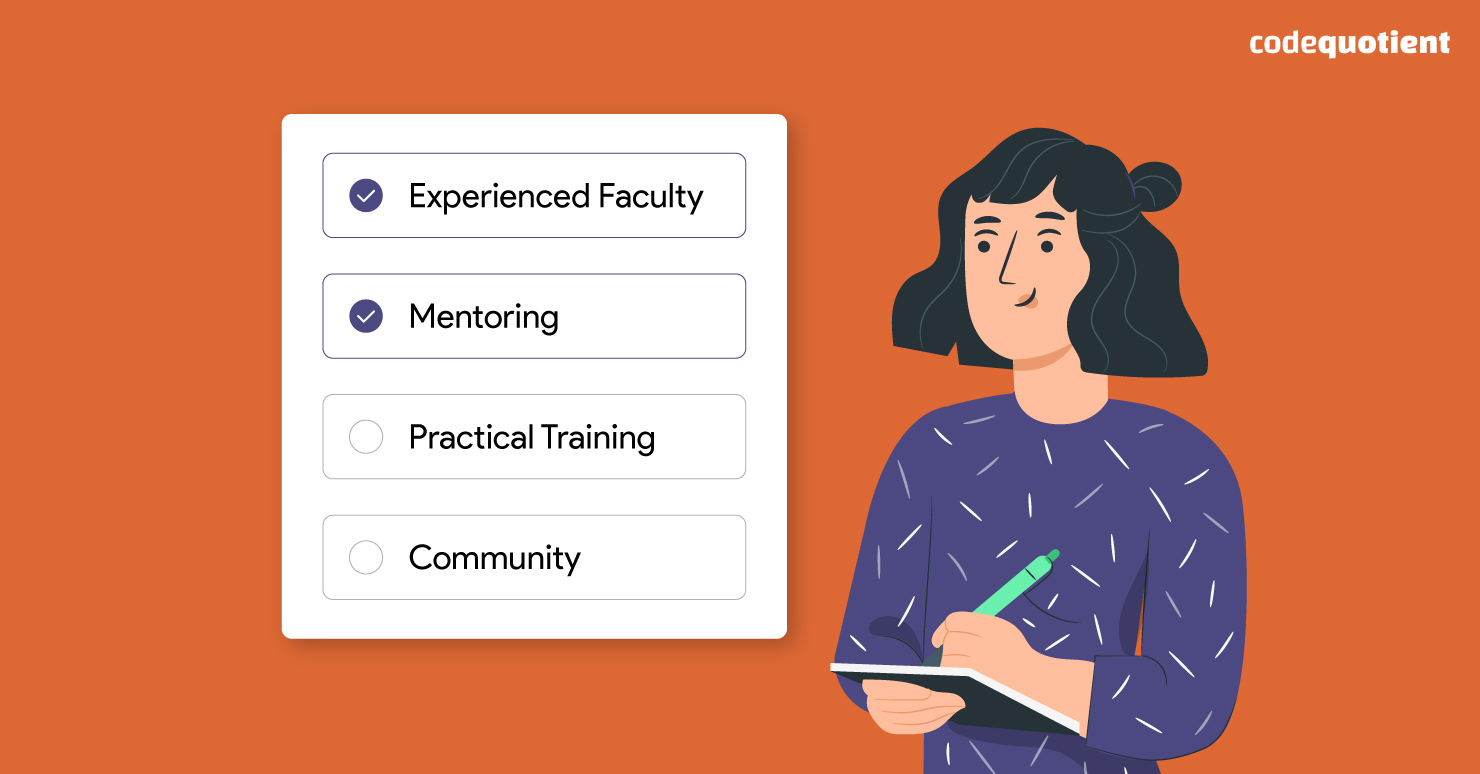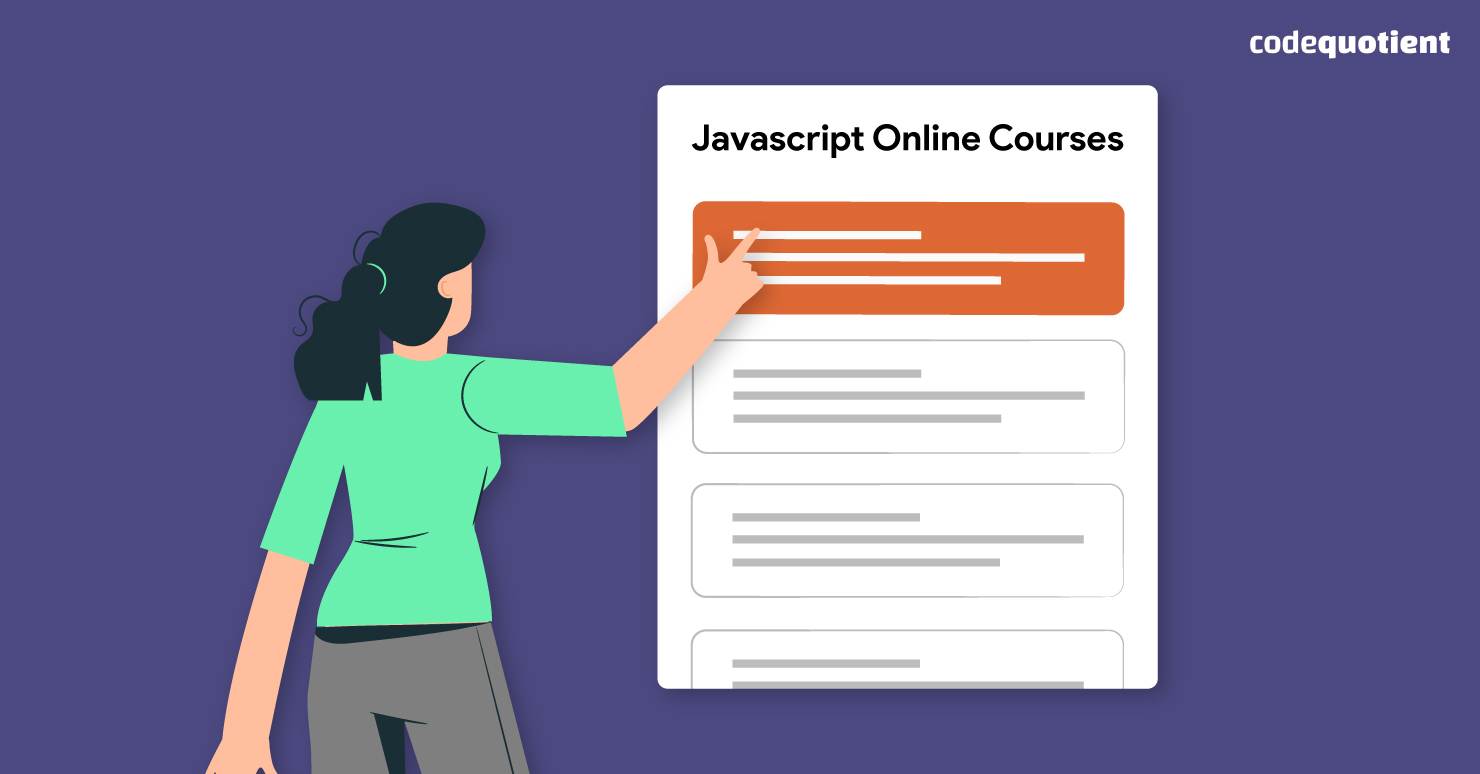So, you want to become a JavaScript coder?
One of the best ways to accelerate your growth as a JavaScript coder is to take a good online course. But unfortunately, there are no shortages of online courses for JavaScript. Hence, it can be pretty challenging to pick a course that suits your needs.
Which one is right for me?
Which course provider to select?
Will the certificate help me move ahead in my career?
Such questions may arise while you’re on the lookout for the best JavaScript course online.
Before spending your hard-earned money (or your family’s) on an online course, you need to consider several factors.
This article will cover seven of the most important things you need to keep in mind.
Factors to Consider While Looking For The Best Javascript Courses Online

Before signing up for an online JavaScript course, you should do your research and check these things:
1. Faculty experience
The first step is to check the credentials of the faculty.
Are they experienced in JavaScript? Have they worked in the industry? Do they have a software engineering degree? Which college did they graduate from? Do they have prior teaching experience?
All of these are questions you should ask before signing up for a course. The quality of the faculty determines how much you will learn from the course.
You should also check whether a single professor is teaching the entire course or whether there is a team of professors. A more collaborative approach may mean that the course will be more insightful and informative.
2. Mentoring
While lectures are essential, mentoring can play a crucial role in your development as a coder.
Mentoring means that there are question and answer sessions, one-on-one feedback, doubt-clearing sessions, etc. In addition, mentoring allows you to check whether what you’ve learned in the classroom can be applied to you in practical situations.
Without mentoring, you may struggle to keep up with the classes. You may have unanswered questions and conceptual unclarity. How will you get ahead of these problems? The answer is a course that offers good mentorship opportunities.
3. Practical training
Coding is all about practice. The more you practice coding, the better you’ll get at it. While classroom learning can ground you in theory, it cannot do your coding for you. To be able to learn correctly and put what you’ve learnt to the test, you need a course that offers practical training.
By practical training, we mean coding projects that are assigned to you. You should be graded on the assignment, and the assignment should have a deadline. All of these things make the practical training as similar to the real world as possible. It is even better if you get personal feedback on your assignments.
4. Community
The great thing about a college experience is learning from your peers.
Online courses can simulate this experience by creating a community of learners. For example, many courses have a WhatsApp or a Facebook group where learners can interact with each other.
Having a community can be essential to your learning experience. Not only is it fun, but it also gives you perspective on how much you’re learning, and you have an outlet where you can share your doubts and concerns.
5. Placement opportunities
This is probably why you join the course in the first place.
You want to get a job as a JavaScript coder. Unfortunately, most online courses will not help you with placements after the course is complete, but there are some courses which offer a lot of assistance to their learners.
It is much easier to get placed through a university than getting placed by applying on your own. In addition, companies are more likely to respond to a university than individuals just out of college.
Hence, you should check whether the online courses you’re considering offer any placement assistance. But look out for any courses that make big promises like 100% placement.
6. Cost
Learning should be free, but unfortunately, we have to pay for our courses.
Even online courses these days can charge a lot of money. Hence, you should always check whether a course fits your budget.
The cost of an online course can vary dramatically. There are some courses that are practically free, while some courses charge an arm and a leg.
When evaluating a course based on cost, you should always ask yourself, “is it worth it?”. For example, if the course is two years long and provides one-to-one mentorship and placement assistance, it is fair for them to charge more than a course that provides a few hours of lectures.
Wrapping Up
Learning JavaScript can be an excellent way to upskill as a coder. There is also ongoing demand for this skill in the market, so job opportunities aren’t too hard to come by.
At CodeQuotient’s SuperCoders Program, you can learn JavaScript and other major languages for front-end and back-end development. You should consider signing up if it meets your needs.




